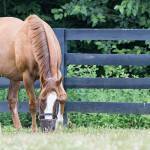Restricted Grazing Alters Intestinal Microorganisms of Horses

Many horses have nutritional requirements that mandate restricted grazing. While this management strategy can help overweight horses or those with endocrinopathies, such as pituitary pars intermedia dysfunction (PPID) and metabolic syndrome to name two, any change in diet or management, including restricted grazing, can alter the intestinal microbiome.
“We know that the vigor of the intestinal microbiome dictates the overall health of the horse. Any change in the abundance or variety of bacteria and other microorganisms that make up the microbiome can have harmful effects,” explained Kathleen Crandell, Ph.D., a Kentucky Equine Research nutritionist.
Detrimental effects of an unhealthy microbiome include altered fermentation, weight loss, diarrhea, immune suppression, and behavioral abnormalities.
To better characterize the effect of restricted grazing on intestinal microorganisms, researchers compared the microbiomes in fecal samples from horses allowed continual or restricted grazing.
The pastures were composed of crabgrass, tall fescue, yellow foxtail, bare ground, and unspecified weeds. In the restricted grazing group, horses were allowed to graze from 8:00 a.m. to 4:00 p.m. and were then muzzled until 8:00 a.m. the next morning. All horses remained turned out during the 14-day study period.
“The study results clearly showed that the fecal microbial communities varied during the study period, and microbiome was altered by restricted grazing,” noted Crandell. “As always, slowly change diets and management strategies, including frequency of feed availability, to avoid major disruptions in the microbial populations of the hindgut. Consider using a hindgut buffer such as EquiShure, which will help protect against changes in pH and support the function of the intestinal microbes that comprise the microbiome.”
*Bowman, M.A., S.E. Pratt-Phillips, and P.D. Siciliano. 2019. Effect of an abrupt diet change on the fecal microbiome. Journal of Equine Veterinary Science 76:78.








